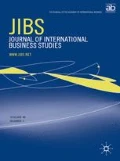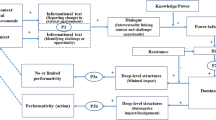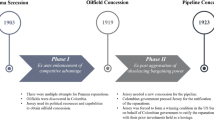Abstract
Internationalization deals with expansion across space and time. Researchers have framed internationalization as market growth and expansion through foreign direct investment (FDI). We use narrative theory to frame a bigger, richer picture. Using Mikhail Bakhtin’s typology of nine space–time conceptions and directed observations of McDonald’s Corporation, we show how multinational enterprises (MNEs) create narratives of internationalization to mitigate the risks of FDI. Competing space–time conceptions in consumers’, authors’ and societies’ stories interact with managerial narratives to affect international product and task environments. We increase awareness of MNEs’ storytelling by offering a typology of stakeholders’ stories across space and time.



Similar content being viewed by others
Notes
We define strategy as realized or emergent patterns in a company’s decisions or actions (Mintzberg, 1994).
Karen Barad proposed (ac)counting as both counting and accounting for holding together the disparate. Barad (2011: 146) elaborated that (ac)counting “cannot be a straight forward calculation, since it cannot be based on the assumed existence of individual entities that can be added to, subtracted from, or equated with one another.” In MNEs’ storytelling, (ac)counting occurs between the mundane and strategic, between past-oriented narrative and living story.
We accept that petrification may sometimes be comprehended post hoc; petrified dominant narratives stamp strong organizational cultures and may provide needed continuity for organizations under certain circumstances.
Ferdinand de Saussure depicted language as a collective product of social interaction, and essential instrument to constitute and articulate the world, influencing developments in the social sciences, with relevance for storytelling.
Mikhail Bakhtin did not explicitly define local and global. We interpret his use of local as referring to individuals and small social groups, and global to collectives (including nations) and (global) society. We interpret present time to include maintaining activities that contribute to value creation.
We selected stakeholders’ stories that interviews and analysis revealed provided justification or opposition for McDonald’s internationalization efforts and presence abroad.
References
Aharoni, Y. 1966. The foreign investment decision process. Cambridge, MA: Harvard University Press.
Associated Press. 2009. McDonald’s rolling out green log in Europe. 23 November.
Bakhtin, M. M. 1981. The dialogic imagination. Austin, TX: University of Texas Press.
Bakhtin, M. M. 1984. Problems of Dostoevsky’s poetics. Manchester: Manchester University Press.
Bakhtin, M. M. 1986. Speech genres and other late essays. Minneapolis, MN: University of Minnesota Press.
Balogun, J., Jarzabkowski, P., & Vaara, E. 2011. Selling, resistance and reconciliation: A critical discursive approach to subsidiary role evolution in MNEs. Journal of International Business Studies, 42 (6): 765–786.
Barad, K. 2010. Quantum entanglements and hauntological relations of inheritance: Dis/continuities, spacetime enfoldings, and justice-to-come. Derrida Today, 3 (2): 240–268.
Barad, K. 2011. Nature’s queer performativity. Qui Parle: Critical Humanities and Social Sciences, 19 (2): 121–158.
Barkema, H. G., & Drogendijk, R. 2007. Internationalising in small, incremental or larger steps? Journal of International Business Studies, 38 (7): 1132–1148.
Barry, D., & Elmes, M. 1997. Strategy retold: Toward a narrative view of strategic discourse. Academy of Management Review, 22 (2): 429–452.
Bartlett, C. A., & Ghoshal, S. 1989. Managing across borders. Boston, MA: Harvard Business School Press.
Berger, P. L., & Luckmann, T. 1967. The social construction of reality. Garden City, NJ: Anchor Books.
Boje, D. M. 1991. The storytelling organization: A study of story performance in an office-supply firm. Administrative Science Quarterly, 36 (1): 106–126.
Boje, D. M. 1995. Stories of the storytelling organization: A postmodern analysis of Disney as ‘Tamara-land’. Academy of Management Journal, 38 (4): 997–1035.
Boje, D. M. 2001. Narrative methods for organizational and communication research. Thousand Oaks, CA: Sage.
Boje, D. M., Oswick, C., & Ford, J. D. 2004. Language and organization: The doing of discourse. Academy of Management Review, 29 (4): 571–577.
Bowman, E. H., & Hurry, D. 1993. Strategy through the option lens: An integrated view of resource investments and the incremental-choice process. Academy of Management Review, 18 (4): 760–782.
Brannen, M. Y. 2004. When Mickey loses face: Recontextualization, semantic fit, and the semiotics of foreignness. Academy of Management Review, 29 (4): 593–616.
Brannen, M. Y., & Doz, Y. L. 2010. From a distance and detached to up close and personal: Bridging strategic and cross-cultural perspectives in international management research and practice. Scandinavian Journal of Management, 26 (3): 236–247.
Brown, A. 2012. Burger King going public again in $1.4B deal. Forbes 4 April: 10.
Brown, A. D. 2006. A narrative approach to collective identities. Journal of Management Studies, 43 (4): 731–753.
Brunelli, R. 2008. McDonald’s brave new world. Brandweek, 49(42): B6–B7.
Burgelman, R. A. 2011. Bridging history and reductionism: A key role for longitudinal qualitative research. Journal of International Business Studies, 42 (5): 591–601.
Cuervo-Cazurra, A., Caligiuri, P., Andersson, U., & Brannen, M. Y. 2013. How to write articles that are relevant to practice. Journal of International Business Studies, 44 (4): 285–289.
Culler, J. 1981. The pursuit of signs. Ithaca, NY: Cornell University Press.
Czarniawska, B. 2004. Narratives in social science research. Thousand Oaks, CA: Sage.
Delios, A., & Beamish, P. W. 2001. Survival profitability: The roles of experience and intangible assets in foreign subsidiary performance. Academy of Management Journal, 44 (5): 1028–1038.
Delmestri, G., & Wezel, F. C. 2011. Breaking the wave: The contested legitimation of an alien organizational form. Journal of International Business Studies, 42 (6): 828–852.
Doz, Y. 2011. Qualitative research for international business. Journal of International Business Studies, 42 (5): 582–590.
Dunning, J. H. 2009. Location and the multinational enterprise: John Dunning’s thoughts on receiving the Journal of International Business Studies 2008 decade award. Journal of International Business Studies, 40 (1): 20–34.
Eden, L. 2009. Time in international business. Journal of International Business Studies, 40 (4): 535–538.
Eisenhardt, K. M. 1989. Building theories from case study research. Academy of Management Review, 14 (4): 532–550.
Fiss, P. C., & Hirsch, P. M. 2005. The discourse of globalization: Framing and sensemaking of an emerging concept. American Sociological Review, 70 (1): 29–52.
Floris, M., Grant, D., & Cucher, L. 2013. Mining the discourse: Strategizing during BHP Billiton’s attempted acquisition of Rio Tinto. Journal of Management Studies, 50 (7): 1185–1215.
Foucault, M. 1977. Discipline and punish. New York: Pantheon Books.
Friedman, T. L. 2000. The Lexus and the olive tree. New York: Farrar, Strauss and Giroux.
Gabriel, Y. 2000. Storytelling in organizations. New York: Oxford University Press.
Gardiner, M. 1992. The dialogics of critique. London: Routledge.
Geiger, D., & Antonacopoulou, E. 2009. Narratives and organizational dynamics: Exploring blind spots and organizational inertia. Journal of Applied Behavioral Science, 45 (3): 411–436.
Geppert, M. 2003. Sensemaking and politics in MNCs: A comparative analysis of vocabularies within the global manufacturing discourse in one industrial sector. Journal of Management Inquiry, 12 (4): 312–329.
Gertsen, M. C., & Søderberg, A. M. 2011. Intercultural collaboration stories: On narrative inquiry and analysis as tools for research in international business. Journal of International Business Studies, 42 (6): 787–804.
Ghoshal, S., & Bartlett, C. A. 1988. Creation, adoption, and diffusion of innovations by subsidiaries of multinational corporations. Journal of International Business Studies, 19 (3): 365–388.
Giddens, A. 1987. Social theory and modern sociology. Palo Alto, CA: Stanford University Press.
Haley, U. C. V. 1991. Corporate contributions as managerial masques: Reframing corporate contributions as strategies to influence society. Journal of Management Studies, 28 (5): 485–510.
Haley, U. C. V. 2001. Multinational corporations in political environments. Riveredge, NJ: World Scientific Press.
Haley, U. C. V., & Haley, G. T. 2013. Subsidies to Chinese industry. New York: Oxford University Press.
Hardy, C., Lawrence, T. B., & Grant, D. 2005. Discourse and collaboration: The role of conversations and collective identity. Academy of Management Review, 30 (1): 58–77.
Harris, R. 1988. Language, Saussure and Wittgenstein. London: Routledge.
Hennart, J.-F. 1982. A theory of multinational enterprise. Ann Arbor, MI: University of Michigan Press.
Hennart, J.-F., & Larimo, J. 1998. The impact of culture on the strategy of multinational enterprises: Does national origin affect ownership decisions? Journal of International Business Studies, 29 (3): 515–538.
Hofstede, G. 1980. Culture’s consequences. Beverly Hills, CA: Sage.
Holaday, S. 2009. Wake up and smell the sizzlin’ daypart. Nation’s Restaurant News 26 January: 66.
Hymer, S. 1976. The international operations of national firms. Cambridge, MA: MIT Press.
Jargon, J. 2013. Burger King’s Big King: A Big Mac by any other name? Wall Street Journal 5 November.
Johanson, J., & Vahlne, J.-E. 1977. The internationalization process of the firm – A model of knowledge development and increasing foreign market commitments. Journal of International Business Studies, 8 (1): 23–32.
Jones, G., & Khanna, T. 2006. Bringing history (back) into international business. Journal of International Business Studies, 37 (4): 453–468.
Jones, M. V., & Coviello, N. E. 2005. Internationalisation: Conceptualising an entrepreneurial process of behavior in time. Journal of International Business Studies, 36 (3): 284–303.
Jonsson, A., & Foss, N. J. 2011. International expansion through flexible replication: Learning from the internationalization experience of IKEA. Journal of International Business Studies, 42 (9): 1079–1102.
Kapica, C. 2004. The role of quick serve restaurants in wellness. McDonald’s Global Nutrition Director presentation, American Overseas Dietetic Association, Cyprus, 27 March.
Kogut, B., & Zander, U. 1993. Knowledge of the firm and the evolutionary theory of the multinational corporation. Journal of International Business Studies, 24 (4): 625–645.
Koschmann, M. A., Kuhn, T. R., & Pfarrer, M. D. 2012. A communicative framework of value in cross-sector partnerships. Academy of Management Review, 37 (3): 332–354.
Kroc, R., & Anderson, R. 1976. Grinding it out. Chicago, IL: Henry Regnery Company.
Lamb, P., Sandberg, J., & Liesch, P. W. 2011. Small firm internationalisation unveiled through phenomenography. Journal of International Business Studies, 42 (5): 672–693.
Lefebvre, H. 2004. Rhythmanalysis. New York: Continuum.
Lounsbury, M., & Glynn, M. A. 2001. Cultural entrepreneurship: Stories, legitimacy, and the acquisition of resources. Strategic Management Journal, 22 (6/7): 545–564.
Love, J. F. 1995. McDonald’s. New York: Bantam Books.
Luo, Y., & Peng, M. W. 1999. Learning to compete in a transition economy: Experience, environment, and performance. Journal of International Business Studies, 30 (2): 269–296.
McCloskey, D. M. 1990. Storytelling in economics. In C. Nash (Ed), Narrative in culture: 5–22. London: Routledge.
Meyer, J. W., & Rowan, B. 1977. Institutionalized organizations: Formal structure as myth and ceremony. American Journal of Sociology, 83 (2): 340–363.
Middleton, S., Liesch, P. W., & Steen, J. 2011. Organizing time: Internationalization narratives of executive managers. International Business Review, 20 (2): 136–150.
Mintzberg, H. 1994. Rise and fall of strategic planning. New York: Simon & Schuster.
Morson, G. S. 1994. Narrative and freedom. New Haven, CT: Yale University Press.
Näslund, L., & Pemer, F. 2012. The appropriated language: Dominant stories as a source of organizational inertia. Human Relations, 65 (1): 89–110.
O’Brien, K. 2012. How McDonald’s came back bigger than ever. New York Times 4 May.
Peirce, C. S. 1931–1958. Collected papers of Charles Sanders Peirce. Cambridge, MA: Harvard University Press.
Pentland, B. T., & Feldman, M. S. 2007. Narrative networks: Patterns of technology and organization. Organization Science, 18 (5): 781–795.
Prahalad, C. K., & Doz, Y. 1987. The multinational mission. New York: Free Press.
Ritzer, G. 1993/2002. The McDonaldization of society. Newbury Park, CA: Pine Forge.
Robichaud, D., Giroux, H., & Taylor, J. R. 2004. The metaconversation: The recursive property of language as a key to organizing. Academy of Management Review, 29 (4): 617–634.
Ryan, G.W., & Bernard, H.R. 2000. Data management and analysis methods. In: N. Denzin, & Y. Lincoln (eds.)., Handbook of qualitative research. Thousand Oaks, CA: Sage, pp. 769–802.
Sabherwal, R., Hirschheim, R., & Goles, T. 2001. The dynamics of alignment: Insights from a punctuated equilibrium model. Organization Science, 12 (2): 179–197.
Sanders, E. 2001. McDonald’s confirms its french fries are made with beef extract. Boston Globe 4 May.
Santangelo, G. D., & Meyer, K. E. 2011. Extending the internationalization process model: Increases and decreases of MNE commitment in emerging economies. Journal of International Business Studies, 42 (7): 894–909.
Schlosser, E. 2001. Fast food nation. Boston, MA: Houghton Mifflin.
Skolnik, S. 2001. Hindus, vegetarians sue McDonald’s over frying process. Seattle Post-Intelligencer 2 May.
Smircich, L., & Stubbart, C. 1985. Strategic management in an enacted world. Academy of Management Review, 10 (4): 724–736.
Starbuck, W. H., & Milliken, F. J. 1988. Challenger: Fine-tuning the odds until something breaks. Journal of Management Studies, 25 (4): 319–340.
Starkey, K., & Crane, A. 2003. Toward green narrative: Management and the evolutionary epic. Academy of Management Review, 28 (2): 220–243.
Taylor, J. R., Cooren, F. A., Giroux, N., & Robichaud, D. 1996. The communicational basis of organization: Between the conversation and the text. Communication Theory, 6 (1): 1–39.
Vaara, E., & Tienari, J. 2011. On the narrative construction of multinational corporations: An antenarrative analysis of legitimation and resistance in a cross-border merger. Organization Science, 22 (2): 370–390.
Vella, M. 2008. A new look for McDonald’s. BusinessWeek 3 December.
Watson, J. (Ed) 1997. Golden arches East. Stanford, CA: Stanford University Press.
Wei, W. 2010. Commercial of the week: Burger King steals McDonald’s recipe. Business Insider 6 April.
Weick, K. E. 2012. Organized sensemaking: A commentary on processes of interpretive work. Human Relations, 65 (1): 141–153.
Welch, C., Piekkari, R., Plakoyiannaki, E., & Paavilainen-Mantymaki, E. 2011. Theorising from case studies: Towards a pluralist future for international business research. Journal of International Business Studies, 42 (5): 740–762.
Westman, P., & Molina, M. 1980. Ray Kroc, Mayor of McDonaldland. Minneapolis, MN: Dillon Press.
Westney, D. E., & Van Maanen, J. 2011. The casual ethnography of the executive suite. Journal of International Business Studies, 42 (5): 602–607.
Wiggans, J., & Birchall, J. 2009. McDonald’s defies global downturn. Financial Times 2 January.
Yagi, N., & Kleinberg, J. 2011. Boundary work: An interpretive ethnographic perspective on negotiating and leveraging cross-cultural identity. Journal of International Business Studies, 42 (5): 629–653.
Yin, R. 2003. Case study research. Thousand Oaks, CA: Sage.
York, E. B. 2009. McD’s secret sauce. Advertising Age, 80 (4): 3, 27.
Zaheer, S. 1995. Overcoming the liability of foreignness. Academy of Management Journal, 38 (2): 341–363.
Author information
Authors and Affiliations
Corresponding author
Additional information
Accepted by Mary Yoko Brannen, Deputy Editor, 4 May 2014. This article has been with the authors for four revisions.
An earlier version of this article was presented at the 28th EGOS Colloquium, “Organizations as Phenomena of Language Use” sub-theme, Helsinki, Finland, July 2012. Editor Mary Yoko Brannen gave generously of her time and ideas to improve this article. We thank her, two anonymous reviewers, George Haley, Robert Maddox and Jennifer Sexton for their excellent suggestions.
Rights and permissions
About this article
Cite this article
C V Haley, U., M Boje, D. Storytelling the internationalization of the multinational enterprise. J Int Bus Stud 45, 1115–1132 (2014). https://doi.org/10.1057/jibs.2014.32
Received:
Revised:
Accepted:
Published:
Issue Date:
DOI: https://doi.org/10.1057/jibs.2014.32




